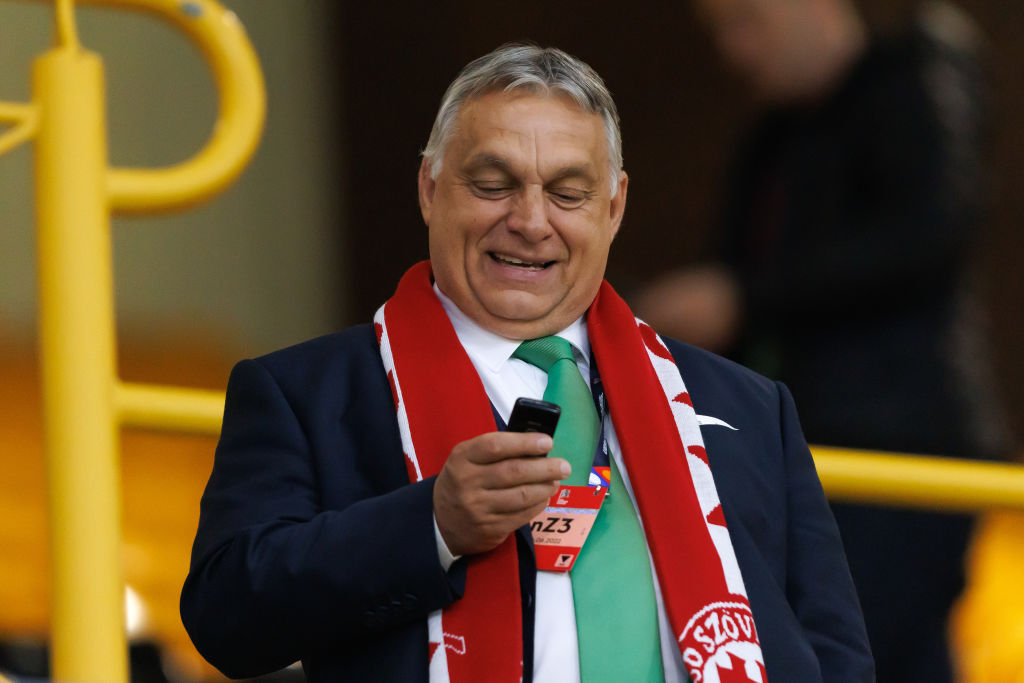But why? György Szöllősi, the editor of the national sports daily Nemzety Sport, and a former head of media at the Puskás Academy, often talks of the need to reverse the underinvestment of the immediate post-communist years — but there are other more obviously important demands on the public purse, notably health and education.
Tracing the results of investment in football infrastructure is never straightforward, but there are worse places to start than 2016, when Hungary qualified for the European Championship, their first appearance at a major finals since 1986. Although they’ve missed out on both World Cups since, they also qualified for both Euro 2020 and 2024 and will play in the highest tier of the 2024-25 Nations League, having twice beaten England in the last edition. And, for the first time in a long time, there is a clutch of Hungarian players at top European clubs — notably Dominik Szoboszlai at Liverpool and Péter Gulácsi and Willi Orbán (no relation) at RB Leipzig. Progress for club sides has been less striking but since 2010, the Hungarian league has risen from 32nd in the Uefa ranking of coefficients to 23rd.
The other big change in football since 2010 has been the crowds, which are slowly growing again. Last season, the average attendance was 3,541. That’s still well down on the mid-Fifties when 15,000 or so was standard — but, excluding the Covid lockdown, the average has risen every year since 2015, when they hit a low of 2,502.
The make-up of crowds is changing as well. Kubatov remembers with shame the monkey-chanting that greeted the visit of Ajax to Ferencváros in 1995, or the way ultras would habitually mark Hitler’s birthday with antisemitic songs and gestures. He has attempted to tackle that in his time as president, with the result that ultras boycotted Ferencváros games for three and a half years. Lighting flares and invading the pitch have been criminalised, while improved security at games, with cameras and tickets that carry biometric data, means that perpetrators can be isolated and prosecuted. “When they’ve been fined 2 million Forints (£4,400),” Kubatov said with a slightly alarming relish, “they’ll think twice about it.”
“Kubatov remembers with shame the monkey-chanting that greeted the visit of Ajax to Ferencváros in 1995.”
Which all sounds very much in line with Fidész’s tough stance on law and order, but it doesn’t tally with memories of the last Euros, when black-clad Hungary fans directed monkey chants at France’s players and brandished homophobic banners. Jude Bellingham and Raheem Sterling were also racially abused during a World Cup qualifier in Budapest in 2021. And when England last played in Hungary, in the Nations League a year later, it was in a stadium from which adult fans had been banned because of racist and homophobic chanting. “The committee that makes a decision like that,” Hungary’s foreign minister Peter Szijjarto said, “is a pitiful and cowardly body. They should be ashamed of themselves.”
Those black-clad fans are the Carpathian Brigade, the result of a Fidész policy that seems to have backfired. In 2009, party leaders met ultra groups from various clubs and, in an attempt to curtail neo-Nazi violence, formed the Brigade. Initially, it was supposed to bring fans together behind the national team while helping various charities. For a while it worked, but as the Brigade grew in popularity, the far-Right element took control and there was violence at games against Romania in 2013 and 2014. Which presents Fidész with a problem. On the one hand, the ultras are on their side on most culture-war issues — but on the other, they have the potential to be an embarrassment while at the same time representing a dangerously anarchic force.

